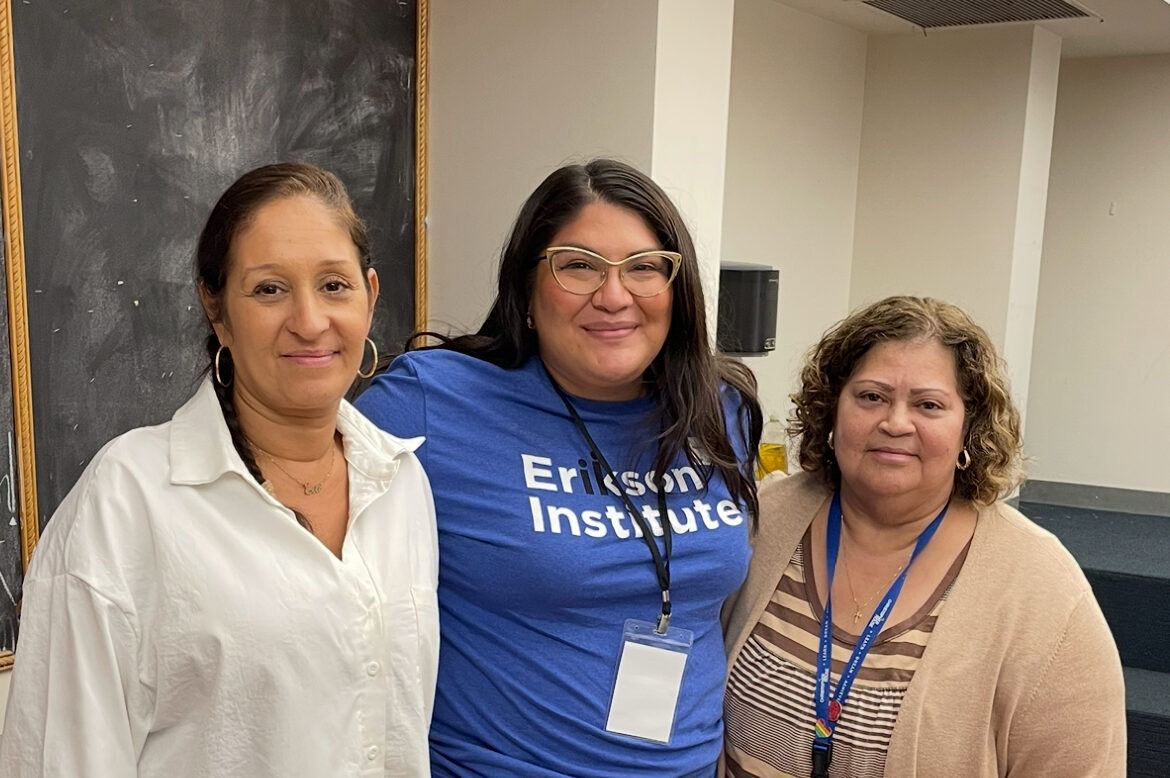Christopher House is built on a two-generation model that meets the needs of our scholars and families, both in and outside of the classroom. This vital work extends across all three of our campuses – Belmont Cragin, Uptown, and Logan Square – and at Christopher House Elementary School (CHES), it would not be possible without the dedication, compassion, and expertise of Family Advocates Diana Villalba and Lesly Lopez.
Joining Christopher House at the height of the pandemic in 2021, both Diana and Lesly were immediately drawn to the empathetic and holistic support offered to the families of our scholars. With Diana’s degree in Psychology and Child Advocacy Studies, and Leslie’s in Human Services and Psychology, both were eager to find the right opportunity that would allow them to have an impact on the lives of their community members. Both Family Advocates have a deep and personal feelings that pulled them toward Christopher House and t they knew that they had found a place they were excited to call home.
We had the opportunity to sit down with Diana and Lesly to learn more about their roles as Family Advocates at Christopher House Elementary School and how their culture, language, and traditions are essential to their work.
What is a CHES Family Advocate?
Lesly Lopez: As Family Advocates, we help families feel safe and comfortable so that they can be open with us and trust us to help get whatever assistance they need. We build relationships with the parents and caregivers of our scholars and help connect them with any additional resources that they might need – we help with everything from obtaining financial assistance and applying for SNAP, to acquiring Ventra cards and accessing immigration-related resources.
Diana Villalba: Our goal is to create and maintain stability within the home. Many of our families have experienced racial trauma and encounter barriers daily. We do whatever we can to respond to their needs and find resources that will help, whether that is inside our walls or within the surrounding community. We also act as a bridge between families and our teaching staff. If parents need assistance communicating with their child’s teacher, or if a teacher notices a student in need of additional support, they reach out to us, and we help facilitate connections and conversations.
Why is our two-generation model important for our scholars and their families?
Diana: My family is from Mexico, and we lived in Los Angeles before moving to Chicago. As a child, I watched my family struggle. My dad worked a lot and when my mom wasn’t working part-time, she was with us. She spoke Spanish, and she had a really hard time communicating with teachers or administration when she came to the school. Seeing and experiencing this for myself has helped me understand what our families are experiencing.
Lesly: I can relate to that a lot… I’m also Mexican and Latina, and my family struggled financially when I was young. We didn’t have any additional support outside of the family, and my mom also only spoke Spanish. She would do her best to advocate for me and my siblings, but because of the language barrier, she often felt unheard. Being in the role that I am now, I am very passionate about what I do because I get to offer the help and support that I wish my family had when I was growing up.
How does your identity and culture support you in this role?
Diana: We can’t support families unless they feel comfortable to be open and honest about their needs. Whatever we can do to facilitate trust between us and the parents and caregivers, we do! We primarily serve Hispanic and Latinx families here at CHES, and when families hear me speak Spanish, it automatically removes one more barrier for them. It makes it easier for them to trust me and open up without any added pressure. I just let families know that a safe space for communication exists whenever they want or need to use it.
Lesly: I agree! When parents come in and see that you are able to speak their language, it creates a sort of immediate natural connection. We can understand their lived experiences on a personal level and can relate to what they are going through. During the pandemic, some families feared that their concerns and needs were not going to be heard. But when we joined the team, we were able to quickly form strong connections and alleviate their stress by letting them know that we see them, we hear them, and we are here to help them – always.
Why is it important to celebrate the identities of our staff, scholars, families, and community members?
Lesly: In my culture, family values are deeply ingrained in everything we do. If someone is hurting, we all are, and if someone is celebrating a win, we all celebrate with them. You don’t want to lose the values of where you come from, no matter what they may be. For our students and families, it’s important they see that when they walk in the school, their traditions and identities don’t stop at the door. We do our best to bring that part of home into the classroom and celebrate it for its importance and beauty.
Diana: For my family of five, we try to get together at least once a month and reconnect over good food, music, and dancing, but honestly, no matter how much time has passed, it’s like we were never apart. I’m also a first-generation college graduate and a proud Mexican. The two are connected! My background has helped me connect with and support families in my current role, and I think it’s really important for my nieces and nephews – and our scholars and families – to see that and to know that there are educational and career pathways for them too. Truly anything is possible.

